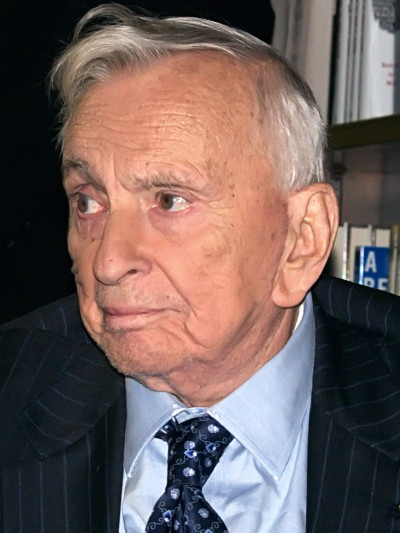Gore Vidal (Gore Vidal)

Gore Vidal (/ˌɡɔr vɨˈdɑːl/; b. Eugene Louis Vidal, 3 October 1925 – 31 July 2012) was an American writer (novels, essays, screenplays, stage plays) and a public intellectual known for his patrician manner, epigrammatic wit, and polished style of writing. As Eugene Louis Vidal, he was born to a political family; his maternal grandfather was Thomas Pryor Gore, U.S. Senator for Oklahoma (1907–21 and 1931–37). As Gore Vidal, he was a Democratic Party politician who twice sought elected office; first to the House of Representatives (New York State, 1960), then to the Senate (California, 1982).
As a political commentator and essayist, Vidal’s principal subject was the history of the United States and its society, especially how the militaristic foreign policy of the National Security State reduced the country to decadent empire. His political and cultural essays were published in The Nation, the New Statesman, the New York Review of Books, and Esquire magazine. As a public intellectual, Gore Vidal’s topical debates, on sex, politics, and religion with other public intellectuals and writers, occasionally became continual quarrels with the likes of William F. Buckley, Jr. and Norman Mailer. As such, and because he thought that men and women potentially are pansexual, Vidal rejected the adjectives “homosexual” and “heterosexual” when used as nouns, as inherently false terms used to classify and control people in society.
As a novelist Gore Vidal explored the nature of corruption in public and private life; the polished, erudite style of narration readily evokes the time and place of the story, and perceptively delineates the psychology of the characters. His third novel, The City and the Pillar (1948), offended the literary, political, and moral sensibilities of conservative book reviewers, with a dispassionately-presented male homosexual relationship. In the genre of social satire, Myra Breckinridge (1968) explores the mutability of gender-role and sexual-orientation as being social constructs established by social mores. In the historical novel genre, Julian (1964) re-creates the imperial world of Julian the Apostate (r. AD 361–63), the Roman Emperor who used general religious toleration to re-establish pagan polytheism to counter the political subversion of Christian monotheism. In Burr (1973) and Lincoln (1984), the protagonist is presented as “A Man of the People” and as “A Man” in a narrative exploration of how the public and private facets of personality affect the national politics of the U.S.
Born
- October, 03, 1925
- USA
- West Point, New York
Died
- July, 31, 2012
- USA
- Hollywood Hills, California
Cemetery
- Rock Creek Cemetery
- Washington D.C.
- USA




